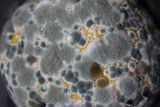Health topic
All articles

Medicinal plants for beautiful amd healthy skin. Part 1
Aging isn't the only misfortune that can befall our skin. Therefore, we put together in one place herbs and medicinal plants that act against acne, help heal wounds and burns, have a calming and anti-inflammatory effect.

Herbs for a healthy heart. Part 1
In this article, we will talk about 3 of the diseases of the heart, for which there are herbs with a beneficial effect, proven by science: arrhythmia, atherosclerosis, and high blood pressure.

Is mRNA vaccine an unexpected ally in the fight against multiple sclerosis
Dr. Uğur Şahin and his team applied mRNA treatment, encoding autoantigen associated with multiple sclerosis, to different mouse models of the disease. The results of the study are promising.

Which herbs relieve hangovers and how to use them
The use of herbs to cope with hangovers rests on two mechanisms: the neutralization of free radicals (antioxidant action) and an increase in the level of enzymes involved in the breakdown of alcohol.

Anxiety and insomnia - what does nature offer
Some of the most serious problems that the modern lifestyle leads to are anxiety and insomnia. More and more people are looking for solutions in the use of medications, which often leads to addiction or loss of their effects over time.

Children need to play outside for a healthy immune system
It is known that children who live in modern societies and in urban environments suffer more often from autoimmune diseases, asthma, allergies, atopic dermatitis, than children who live closer to nature. There are many reasons for this...

Herbs for autoimmune disease sufferers and transplant patients
We are mostly used to looking for immunostimulating action in herbs, but there are at least two groups of people who need immunosuppression: those suffering from autoimmune diseases and those who have undergone transplantation.

Which herbs and supplements regulate the cycle in polycystic ovary syndrome for easier conception
Polycystic ovary syndrome is one of the most common causes of infertility in womеn, due to no ovulation or difficulties in predicting when this is most likely to happen.

Saline inhalation may help with pneumonia
Attention! It is important to note that pneumonia in Covid-19 has its peculiarities distinguishing it from other types of pneumonia, and now, more than ever, it is important to coordinate each action with a doctor, so as not to harm our health.

Mold and mildew - the hidden allergens
Symptoms of allergy to mold and mold are very similar to those of hay fever: stuffy or flowing nose, laity and itching in the eyes and nose, sneezing and even skin manifestations such as dry and flany skin.